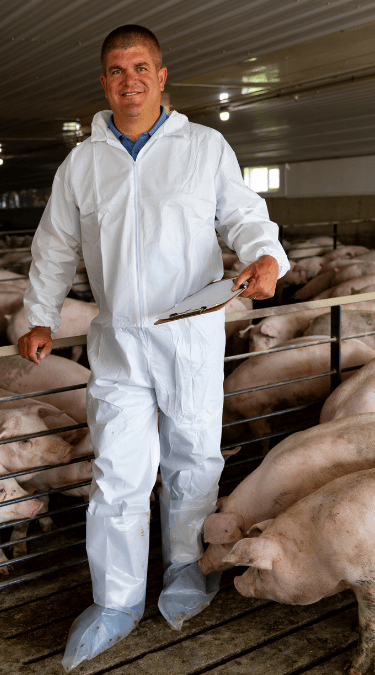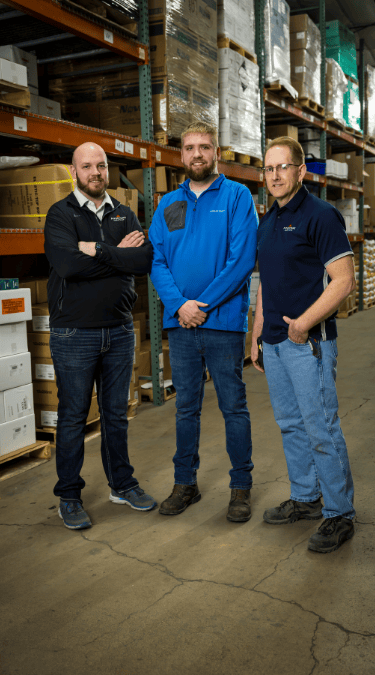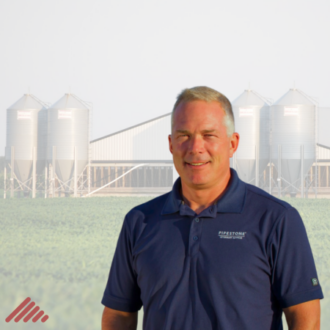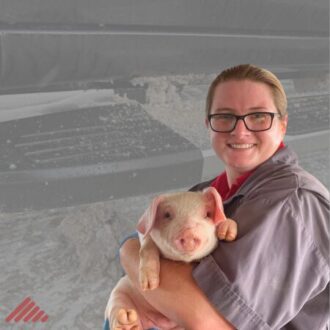When summer temperatures climb, managing barn conditions becomes critical—not just for comfort, but for pig health and performance. Misters are a key tool in helping pigs stay cool. When barn temperatures rise above a set threshold, misters activate to wet pigs and begin the process of evaporative cooling. The goal is simple: run them long enough to get pigs wet, then shut them off long enough for pigs and floors to fully dry.
This “wet-to-dry” cycle is essential for effective cooling and will vary by barn setup and equipment—especially if you’re using mister tips versus soaker tips. As a general rule of thumb, aim for 2 minutes on and 20 minutes off.
Misters should be used on healthy pigs weighing at least 100 pounds, with threshold temperatures typically set between 80°F and 85°F, depending on pig size and condition. If possible, restrict cooling cycles to daytime hours (6 a.m. to 10 p.m.) when heat stress is most likely.
But misters do more than provide relief—they play a direct role in protecting pig health, maintaining feed intake, and ensuring consistent growth. When managed correctly, they’re one of the most effective tools for improving welfare and production during hot weather.
Maintaining Feed Intake
Heat-stressed pigs often reduce their feed consumption as a natural response to elevated body temperatures. This drop in intake can quickly lead to decreased growth rates and poor performance. By cooling pigs effectively, misters help pigs stay on feed and continue gaining weight consistently.
Preventing Heat-Related Health Issues
- Hemorrhagic Bowel Syndrome (HBS): One of the clearest benefits of misters is preventing heat-related feed disruption. When pigs go off feed during heat stress and then gorge once they cool off, they become more prone to HBS. Keeping pigs cool helps maintain consistent intake and reduces this risk.
- Respiratory Stress: In hot conditions, pigs increase their respiration to try to cool down. Misters reduce the need for this, easing respiratory load and improving overall well-being.
- Overheating and Mortality: Pigs cannot sweat like humans. They rely on evaporative cooling—moisture applied to their skin must evaporate to release body heat. Without the ability to cool down properly, pigs can overheat and die. Misters provide a critical tool for temperature regulation and survival.
Reducing Stress
Pigs exposed to prolonged heat stress often become restless, pile on each other, and exhibit signs of agitation. These behaviors increase the risk of injury and can suppress the immune system. Misters help create a more stable, calm environment, reducing stress-related health challenges.
Improved Growth and Marketing Outcomes
- Healthier, cooler pigs:
- Grow more evenly across groups
- Reach market weight on schedule
- Require fewer interventions, saving time and labor
- Contribute to better returns due to improved survivability and efficiency
System Monitoring
It’s also important to keep a close eye on your cooling system. A properly functioning mister system should not significantly increase pit moisture or affect manure composition. However, a leak or malfunction can introduce excess water into the pit, diluting nutrients and impacting manure management and application plans. Regular system checks protect both your pigs and your bottom line.
Helpful Reminders:
- Only run misters on healthy pigs.
- Allow enough “off” time to fully dry pigs and flooring.
- Set temperature thresholds between 80°F–85°F.
- Standard timing: 2 minutes on / 20 minutes off.
- Ensure all misters are working properly to avoid flooding pits and maintain manure quality.











